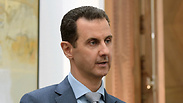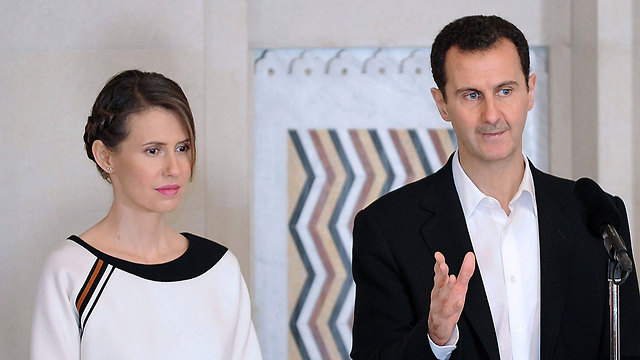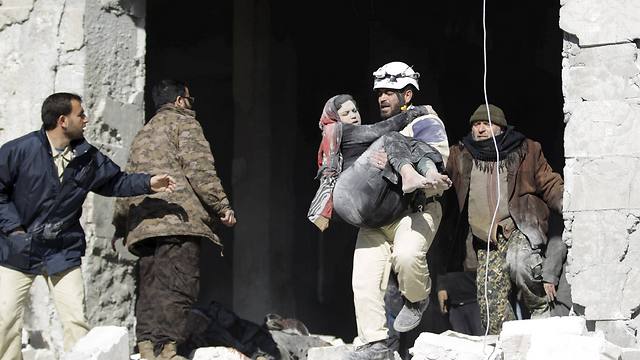
Facing a critical juncture, Assad is still putting up a fight
Six years into the bloody civil war, the Syrian tyrant’s regime appears stable and Russia will do everything to keep him in power. The situation, however, remains very fragile and the rebels are just a few kilometers away from the presidential palace. And in the Middle East, as we know, anything can happen.
“Have you considered leaving the country?” one of the journalists mustered the courage to ask a profound question.
“Absolutely not. The six difficult years are already behind us,” the president replied decisively. “Even three years ago, when things were very hard, I didn’t dream and didn’t think of leaving. I’m staying here, with my people. Only if my people ask me to, I’ll consider stepping down.”

And then they brought in the photographers, to produce a family picture: Bashar, his beautiful wife Asma, who has kept a low profile in recent weeks, and their three children—Hafez, Sein and Karim.
Assad, who is known for his odd gestures and slightly delusional anecdotes, pointed at his 16-year-old eldest son and said proudly: “Hafez Jr. (who is named after his late grandfather, the former president of Syria) has decided to study Chinese. We didn’t pressure him and didn’t try to affect his choice. My son insists on explaining to me that the future is in China, and he has far-reaching plans on the Chinese issue.
“The two Chinese people who taught my son,” Assad added, “decided to leave Syrian without any warning. We are now looking for a private teacher. If you know any Chinese speakers in Syria who would be willing to teach my son, ask them to contact the palace.”
465,000 people dead
In the “People’s Palace,” on the hill overlooking the center of Damascus, people are trying to lead a routine life despite the sounds of the bombings from the Syrian capital’s suburbs. This is where the Syrian president’s family lives and where his offices are located. In the entrance floor, workers are running around in the huge marble hall where the Rais receives his local and foreign visitors. After six bloody years, Assad is making an effort to host, is welcoming delegations from the Arab world and Western diplomats, and is even accepting very few American visitors.
The advisors are making an effort to fill up his presidential schedule, says Andrew Tabler, a senior expert on Syria who lives in Washington. It’s important for Assad to prove to the world that he is still in control of the country despite all the harsh criticism against him, Tabler adds.

Robert Ford, who was the last American ambassador in Damascus, is optimistic as well regarding Assad’s situation six years after the beginning of the war: “We have to be realistic—he’s not leaving,” he says, adding that there is no one holding a gun to Assad’s head or giving him an ultimatum to get up and leave in light the horrible things taking place in Syria.
Last Tuesday, Syria's flags were hung along the roads connecting Amman to the luxury hotels on the Jordanian side of the Dead Sea. That was the compromise reached behind the scenes in a battle waged ahead of the 28th Arab summit, which took place on Wednesday. Jordan and Egypt pushed for inviting Assad to attend the meeting of the Arab heads of state. Saudi King Salman threatened to boycott the event should “the criminal” get an invitation and show up. But King Abdullah is already preparing to bring up the Syrian issue. Jordan is “hosting” 800,000 Syrian refugees, who are burdening the economy, wandering on the streets and occupying jobs at the locals’ expense.
At least five million Syrian citizens—mainly women, children and elderly people—have managed to flee the bombed cities. They have been living for four or five years now in refugee camps in turkey, Kurdistan, Lebanon and Jordan, and in absorption centers in Europe and in Canada. A million and a half displaced homeless people are wandering within their country after losing their property in the bombings.
Rami Abdul Rahman, who runs the UK-based information office documenting the number of victims in the Syrian bloodbath, presented horrifying figures last week: A death toll of 465,000 people, 200,000 people who have gone missing (and who have been likely buried in secret mass graves), 300 hospitals that have been bombed and destroyed and 650 children aged two to ten who were killed last year.
The world was shocked by the heart-rending image of Alan, a three-year-old Kurdish boy whose body was washed up on a beach in Turkey. The picture of five-year-old Omran—who was photographed sitting in the back of an ambulance dazed, covered with dust and blood, as his big and innocent eyes search for his relatives who disappeared among the ruins—shocked the world as well.
The president’s wife, Asma Assad, got an opportunity to respond to the images of the two children, the living child and the dead child, in an interview to the Russia Today news channel. We are not ones who hurt the innocent children, she recited. We are trying to protect all our citizens against the terror organizations, which are sending armed thugs to catch women and small children in order to harm Syria's internal stability, she said without blinking.
The Arab media fought back. A series of photos posted on social media shows Bashar in a suit and tie and Asma in the expensive dresses that are still being delivered to her from fashion houses in Paris and London, posing for a selfie with Syrian citizens who were invited to express their admiration for the presidential couple. And what a surprise: Five of the people photographed with the couple—three men and two young women—were killed only several weeks after the documentation. “Either they annoyed the Mukhabarat (Syria's military intelligence system) or the rebels identified the government’s sycophants and settled the score with them,” Syrian commentators estimated.
The sound of birds in Damascus
Even if Assad appears to be the winner of this war—under the protection of the Iranian Revolutionary Guards, Hezbollah fighters and the air cover he is receiving from Russian President Vladimir Putin—the Syrian civil war is far from being over. The ceasefire reached by United Nations representatives has lasted in very few places.
The real battle is now crawling towards the Damascus suburbs. According to the rebels’ reports, large forces have been emerging in the past few days from underground tunnels, detonating car bombs, massacring Syrian army soldiers and taking officers hostage. On the other hand, in the main news broadcast in Damascus last Monday, a state television newscaster went on about the calm atmosphere and the sounds of birds in the capital—while the sounds of bombings can be heard from every part of the city.
So while Assad’s position appears to be stable, and the Russians will do everything to preserve his regime, the situation is still very fragile and the rebels are just a few kilometers away from the palace. And in the Middle East, as we know, anything can happen.
On Monday, after the missile interception incident between Syria and Israel, while government speakers in Damascus were boasting that “we shot down two of the Zionist enemy’s planes,” Assad summoned Russian journalists and dropped a diplomatic bomb: “Russia could play an important role in curbing the conflicts between us and Israel,” he announced.
“That still doesn’t mean that Assad panicked following the infiltration of the Israel Air Force planes and that he is suggesting Russian-brokered negotiations,” explains Dr. Mustafa Karaman, a former lecturer at the University of Damascus, who is now living in exile in Turkey. “It means that Assad is familiar with the smallest details of the discreet dialogue between Netanyahu and Putin, and is making an effort to stress just how loyal he is to the Russians and how much he trusts them.”
The six years of war have made 52-year-old Assad more mature. He has become more suspicious, he makes sure to occasionally change the presidential guard and his bodyguards, and he knows that he is surrounded by a group of sycophants whose fate and lives depend on his own fate. He also knows that the world’s goal is to keep him in his weakened position, and that next year the effort will focus on destroying ISIS's center of power in the organization’s capital, ar-Raqqah, in northern Syria.
An entire generation of miserable, orphaned and displaced homeless children are the horrible reminder of the six-year war. Some suffer from malnutrition, some haven’t learned to read or write, and the older ones will carry the scars of the arrests and the brutal interrogations in the prisons. Children of refugees are sent on the streets to get a job and find food for their families. Underaged girls are sent by miserable mothers to work as prostitutes or are sold to be married—instead of going to school—to anyone who can offer $100 or $200.
Assad, however, is not concerned—not even when he is reminded that Syrian citizens are begging for medical care in Israeli hospitals. “I sleep fine at night,” he keeps informing Western journalists. “I have no nightmares. My conscience is completely clear because I do whatever I can and whatever it takes to protect the citizens of my country.”











